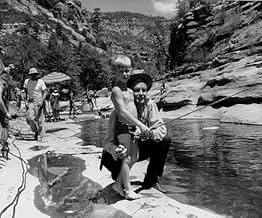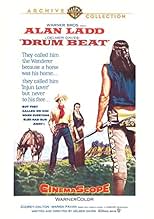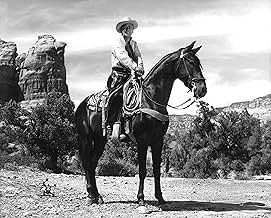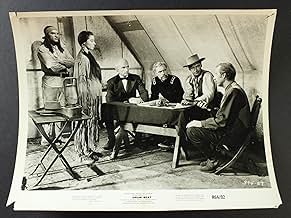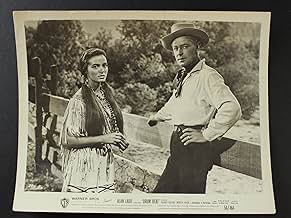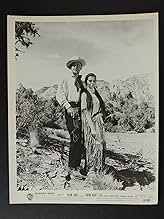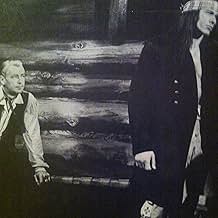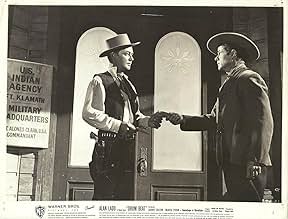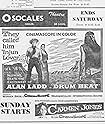En 1872, le combattant indien Johnny MacKay est nommé commissaire à la paix pour le territoire de la Californie et de l'Oregon, mais il se heurte à la forte opposition des Modocs renégats me... Tout lireEn 1872, le combattant indien Johnny MacKay est nommé commissaire à la paix pour le territoire de la Californie et de l'Oregon, mais il se heurte à la forte opposition des Modocs renégats menés par leur chef Captain Jack.En 1872, le combattant indien Johnny MacKay est nommé commissaire à la paix pour le territoire de la Californie et de l'Oregon, mais il se heurte à la forte opposition des Modocs renégats menés par leur chef Captain Jack.
- Réalisation
- Scénario
- Casting principal
- Modoc Jim
- (as Frank de Kova)
- Capt. Alonzo Clark
- (as George Lewis)
Avis à la une
However, credit director Delmer Daves for finding some gorgeous locations for his story and casting Charles Bronson and Anthony Caruso as Indians who look marvelously authentic in their make-up. Not so fortunate are Marisa Pavan and Audrey Dalton in the weak female roles that could have been played by any young ingénue on the Warner lot.
Alan Ladd is the Indian expert hired by President Grant to make peaceful overtures to the Modocs, headed by Bronson. Elisha Cook, Jr. is interesting as a corrupt Indian trader and most of the supporting roles get good results, especially in the action scenes, all of which are well-staged by director Daves. Especially good is a climactic fight between Ladd and Bronson as they tumble down a rushing stream and fall over the rocky terrain. Ladd seems to be doing most of his stunts in this action-packed scene.
But otherwise, he delivers a rather stoic performance, showing barely any expression even in his brief love scenes with Audrey Dalton. Hard to tell if he was bored or just impatient with the routine script.
All in all, worth watching for the action scenes and the handsome landscapes filmed in beautiful WideScreen Technicolor.
Also, for this Bronson fan, that jail cell ending may well be the high point of his acting career. He shows more unforced good humor and naturalness there than any scene I've seen him in. In fact, he easily steals the movie from the rest of the cast, positioning himself as a real Hollywood comer.
This is an A-production from Warner Bros. For example, scope out the well stocked cavalry troop. No corner-cutting there. Then too, lavish use is made of Sedona's familiar red rock locations adding real scenic value. Also, there's a much larger than usual supporting cast of familiar faces, even down to bit parts. Producers Daves and Ladd (uncredited) do a bang-up job assembling the many components.
Surprisingly, for plot developments, the Indians actually get to win a battle and rejoice on- screen. However, the film's impact is damaged by being over-long, probably to accommodate a romantic interest to broaden audience appeal. Then too, Ladd, the actor, appears not nearly as interested in the film as Ladd, the co-producer. Frankly, he looks glum throughout the nearly two-hour running time, and I don't think it's from under-playing the part. Plus having him over-power the muscular, extremely fit looking Bronson is quite a stretch.
Despite these several drawbacks, it's still a good scenic, action flick, the first of director Daves' series of superior Westerns.
Ladd, with the aid of Modoc Indians that desire peace, attempts to settle the conflict, but hostilities do break out between the tribe and the soldiers. This was the role that Ladd seemed to shine best in, that of the tight-lipped, slow-to-anger, tough guy. Watchable western fare.
Coming back to this film, it did show the native Indians in a bad light. Alan Ladd's character describing how his family got butchered. The Natives planning for a double standards during a peace powwow. The Natives shooting unarmed civilians.
The plot - A veteran Indian fighter Johnny MacKay (Alan Ladd) is appointed peace commissioner by the President to end the hostilities between settlers, soldiers and Modoc renegades. Johnny is helped by the children of an old Modoc chief who tells Johnny that it is a chief called Captain Jack (Charles Bronson) and his band of brutal renegades are opposing the peace negotiations while most of the other Modocs wish to coexist n live in peace.
For the first time an American general was killed during the wars against the Indian tribes. The little known Modoc war was another of those lesser known conflicts as action against the Sioux on the Great Plains and the Apache in the Arizona desert got far more attention.
The Modocs were moved from a reservation in northern California to one in Oregon to share with the Klamath, a tribe that had a long feuding history with the Modoc. That was the immediate cause of the war. It was kept going by one of the Modoc's more charismatic leaders, a chief named Captain Jack.
On April 11, 1873, General E.R.S. Canby among other peace commissioners who were sitting in council with Captain Jack and the other chiefs were suddenly shot and killed, in fact Captain Jack personally did shoot General Canby. Charles Bronson in his very first film with that name having dropped his real birth last name of Buckinsky plays Captain Jack. Warner Anderson plays the feckless and luckless Canby.
The horror of that incident aroused some bad public opinion against the Modocs, not to dissimilar against to what was aroused against the Japanese after Pearl Harbor and Islamist extremists after the World Trade Center attack albeit on a much smaller scale. It certainly shifted priorities for a while in the War Department from the Sioux and the Apache.
Alan Ladd plays a real frontier figure named Johnny MacKay who as the film has him was a civilian scout employed by the army to find Captain Jack. His role in real life was not at the center stage of the film, but he did play a part in the Modoc Wars. And he was not among the surviving peace commissioners he wasn't at the meeting when the assassinations happened.
For all its inaccuracies Drum Beat is the only film I know to deal with this incident that shocked a nation during The Gilded Age.
Le saviez-vous
- AnecdotesActor Charles Buchinsky (his birth name) changed his name to Charles Bronson, using his new moniker for the first time in this film, and remained so for the rest of his acting career.
- GaffesPresident Grant is shown wearing his Army uniform in the White House. This is inaccurate as General Grant resigned his commission in 1869.
- Citations
Dr. Thomas: Don't you feel like a murderer?
Johnny MacKay: No, sir.
Dr. Thomas: Shouldn't you?
Johnny MacKay: I've never shot anyone without cause. My job is to protect the wagon train. When somebody shoots at my people, I shoot back.
- ConnexionsFeatured in The Good Life (2007)
Meilleurs choix
- How long is Drum Beat?Alimenté par Alexa
Détails
Box-office
- Budget
- 1 100 000 $US (estimé)
- Durée1 heure 51 minutes
- Rapport de forme
- 2.55 : 1
Contribuer à cette page


